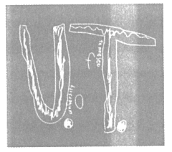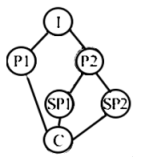1 . 
Enjoy an amazing time in Lake Tahoe, CA with the fantastic show, Magic Fusion! This fantastic display features a variety of talented magicians who each take to the stage with their own flare, tricks, and illusions(视觉幻想) that will have the audiences who witness the show on the edge of their seats.
Presented by the amazing Loft Theatre, this show has seen the likes of famous magicians such as Robert Hall and Chipper Lowell. Each evening stars a different magician as well, so you can enjoy a variety of talented performers all on the same stage. It is great for all ages, so you can bring the entire family along to be excited and entertained during this 75-minute performance. You never know what you may see, so do not miss out!

The Loft Theatre is Lake Tahoe’s premier place for entertainment and delicious food. Not only is it home to amazing shows that will entertain and thrill, but it is also home to a dining experience that serves up some mouthwatering meals. Before your show, be sure to grab a bite to eat before heading over to enjoy the Loft. It is located in the extremely popular Heavenly Village area of Lake Tahoe next to sparkling fountains and the famous Heavenly Toy Shop. It also features a lounge(休息室) and guests who arrive early can enjoy food, fun, and magicians who will wow you with tricks for that extra dose(量) of entertainment!
For an amazing experience that you will not soon forget, be sure to enjoy this fantastic performance at the Loft Theatre!

Enjoy this amazing show that will keep you guessing with tons of great tricks and illusions to keep you and your whole family entertained. You can be on the edge of your seat with this option of regular seating to witness this fantastic show, or experience the Magic Fusion show in the best seats possible. Order your tickets today!

1. What can we learn about Magic Fusion?
| A.It is intended for all the family members. |
| B.The display will last for one and half hours. |
| C.Different performers will be performing together. |
| D.Audiences will be invited onto the stage during the show. |
| A.lies in a famous largely populated area |
| B.is well-known for the surrounding scenery |
| C.serves food before and after the performance |
| D.provides those who come early with extra show |
| A.The performance on Friday finishes earlier. |
| B.The show starts from 9:00 pm every Tuesday. |
| C.There are two performances available every Sunday. |
| D.Regular and VIP seating are offered on different days. |
2 . John Harrison has an enviable job in most people’s opinion. He’s the official taster for Dreyer’s Grand Ice Cream, one of the best-selling ice-cream brands in the U.S.A. On an average day, Harrison has to sample sixty ice creams at the Dreyer’s headquarters. When he isn’t doing that, he travels all over the country, buying Dreyer’s ice cream in supermarkets so that he can carry out spot checks for appearance and flavor. But, no matter how wonderful this job may sound, it is actually quite tough. It’s difficult work, requiring discipline, selflessness, and thorough preparation.
Before tasting a sample, Harrison uses his eyes first. If the ice cream doesn’t look attractive, he skips it. Then, he uses a gold spoon instead of one made of wood, plastic, or other metals. This is because regular spoons leave an aftertaste that can dull the taste buds(味蕾). In addition, the temperature of the ice cream may also influence the taster’s taste buds.
When Harrison samples ice cream, he first takes only a small bite of the ice cream, swishes it around in his mouth to introduce it to each of his taste buds, lightly licks his lips, and then gently breathes in so as to bring the smell up through the back of his mouth to his nose. With each step, he carefully sizes up whether the ice cream conveys the ideal balance between dairy sweetness and the flavor of the added ingredients. And last of all, no matter what the ice cream tastes like, he spits(吐) it out, since a full stomach makes for a dull palate(迟钝的味觉).
For Harrison, keeping a sharp palate means no onions, garlic, or cayenne pepper. He also doesn’t have any coffee or tea, since these block the taste buds. But to him, this is just a small price to pay for what he calls “the world’s best job” .
Harrison’s family has been in the ice-cream business for four generations, and Harrison himself has spent almost his whole life in it as well. Yet, he has never lost his love of the cold, creamy sweetness. He orders ice cream in restaurants for dessert, even when he’s not at work. On these occasions, he swallows the ice cream, taking in about a liter a week. Though he has gained some weight over the years he’s been with Dreyer’s, he couldn’t care less. “Who would trust a skinny ice-cream taster?” he jokes.
1. What is forbidden in Harrison’s job?| A.Doing shopping. | B.Eating the ice cream. |
| C.Using gold spoons. | D.Skipping the ice scream. |
| A.He learned his work skills from his family. |
| B.His job affects his appetite for the ice cream. |
| C.He is willing to give up something for his job. |
| D.He has to gain some weight to meet the need of work. |
| A.Creative. | B.Ordinary. |
| C.High-paying. | D.Proud. |
| A.To describe Harrison’s job and how he does it. |
| B.To analyze the reasons why Harrison chose his job. |
| C.To make suggestions on how to apply for popular careers. |
| D.To introduce the advantages of working for a best-selling brand. |
3 . During his school's “College Colours Day”, a fourth-grade boy in Florida, who dreams to become a student of the University of Tennessee, wanted to wear a shirt of the university, but he didn't have one. His teacher, Laura Snyder, suggested that he should wear an orange shirt to show his spirit.
When the day finally arrived, the boy was so excited to show his shirt-an orange one with a piece of paper attached to it, on which was his homemade design of the UT logo.
But by lunch time, the spirited fan was in tears. Some girls bullied (霸凌) him and made fun of his design that he had pinned to his shirt. Back to Snyder 's room, he put his head on desk and was crying, devastated.
In hopes of raising the boy's spirits, Snyder planned on buying him an official University of Tennessee T-shirt, and asked friends online if they had contacts with the university who could “make it a little extra special for him.”
The post immediately went viral and Snyder was contacted by the University of Tennessee informing her that they wanted to send the boy a care package of swag and apparel(服装) in support of him.
The story, however, didn't end here. The University of Tennessee said it was turning his “U.T.” design into an official T-shirt and had pre-sold more than 50,000 shirts online. The university won't profit from the shirts: It is donating the money to a charity dedicated to (致力于) getting rid of bullying of all forms.

“When I told him that his design was being made into a real shirt and people wanted to wear it, his jaw dropped," said Snyder. “He had a big smile on his face, walked taller, and I could tell his confidence grew!”
In recognition of the fourth-grader's spirit, the university has also extended an offer of honorary admission for him to join the Class of 2032. In addition, he has been awarded a four-year scholarship if he decides to attend UT in 2028 and meets admission requirements.
1. How did the boy react to his school's “College Colours Day”?| A.He prepared for it with a creative design. |
| B.He dreamed of winning a prize on the day. |
| C.He was afraid of being laughed at on the day. |
| D.He was shy of joining it without a university shirt. |
| A.Excited and thankful. | B.Confident and happy. |
| C.Shocked and sad. | D.Nervous and worried. |
| A.a strong will is vital to success |
| B.a promise will change one's life |
| C.the youth should be treated equally |
| D.caring love can make a big difference |
4 . New Zealand Cruise (游轮) & Australian Open Tennis
Includes tickets to the Women’s and Men’s Finals at the Australian Open
Number of days: 16 days (Leaving: 31 January 2020)
This holiday serves up the perfect experience for any tennis fan with tickets to the Australian Open, hotel stays in Melbourne and Sydney and a cruise around New Zealand’s coastline.
Discover your itinerary (日程安排)
Dayl-4 Melbourne (Hotel stay & Australian Open)
Melbourne is famous for its markets, where you’ll find everything from local produce to arts and fashion. During your stay, experience all the excitement of the Australian Open, one of the world’s most exciting sports tournaments and 2020’s first Grand Slam (大满贯). With tickets to the Men’s and Women’s Finals, you’ll see the best tennis stars in the world compete for glory in game like no other.

Day 5-8 Sydney (Hotel stay)
Sydney is far more than the Opera House, Harbor Bridge and inviting beaches. Walk along the coastal paths, with rock pools, where you can watch surfers ride the waves.
Day 9-12 At sea
Day 13 Milford Sound (Scenic cruising)
You’ll travel through amazing natural beauty in South West New Zealand, where mountain tops are shown in mirror-smooth waters. In this important wildlife habitat, you could see a Little Blue penguin (企鹅) or two, as you travel past the breathtaking sight.
Day 14 Dunedin
Don’t miss the gardens at Larnach Castle, including the Serpentine Walk, the Alice Lawn and a native plant path; a true dream for plant lovers.
Day 15 Tauranga
As you sail into Tauranga’s scenic harbor, you’ll pass Mount Maunganui, a dead volcano crossed with walking paths and dotted with hot saltwater pools.
Day 16 Auckland
1. In which city can you buy the local produce of Australia?| A.Melbourne. | B.Sydney. |
| C.Dunedin. | D.Tauranga. |
| A.On Day 8. | B.On Day 13. |
| C.On Day 14. | D.On Day 15. |
| A.sports stars | B.tennis fans |
| C.surfers | D.climbers |
5 . Antiquities are ancient objects and artworks. Many people visit museums to view antiquities. They enjoy seeing these relics of the ancient world as a way of understanding past cultures and sometimes connecting with their own heritage.
Museums get works to show from many different sources. Sometimes they buy them. Other times they receive donations. Today there are strict guidelines forbidding art that has been stolen from other countries. However, antiquities that have been at museums for many years or even centuries may have arrived there by dishonest means. Now, some countries say that museums have a duty to return these antiquities to their original locations.
Should museums return the antiquities? Experts disagree. Malcolm Bell says yes. Bell is a professor of art at the University of Virginia. He says, “Many antiquities and works of art have special cultural value for a particular community or nation. When these works are taken from their original cultural setting, they lose their context and the culture loses a part of its history.”
According to Bell, a country’s request for the return of an antiquity “usually has a strong legal basis.” “It was exported (出口) illegally, probably also dug out illegally, and is now stolen property (财物).” He called the return of antiquities “an expression of justice”.
James Cuno says not always. Cuno is the president of the J. Paul Getty Trust, an art museum in Los Angeles. Cuno agrees that museums have a legal duty to return illegally exported antiquities. However, he doesn’t support the return of works which were got legally. “Land held today by a given nation-state in the past likely belonged to a different country...even if one wanted to return those stolen works of art, where would one do so? Which among the many countries, cities, and museums that own parts of a work of art should be the home of the returned work?” Cuno believes that museums should collect art from the world’s various cultures. This should be done “through buying or long-term loan (长期租借) and working together with museums and nations around the world.”
This debate is far from over. As a complex question with no easy answer, the issue requires more study.
1. What can we learn from the first two paragraphs?| A.Museums got antiquities through various means. |
| B.Antiquities from other countries are more valuable. |
| C.Antiquities are greatly appreciated by foreign visitors. |
| D.Museums around the world have lost many antiquities. |
| A.illegally-owned antiquities should not be shown |
| B.museums should return illegally-owned antiquities |
| C.antiquities from other countries may lose its cultural value |
| D.museums should collect antiquities from different cultures |
| A.Positive. | B.Negative. |
| C.Objective. | D.Uninterested. |
I: Introduction P: Point SP: Sub-point C: Conclusion
A. | B. |
C. | D. |
6 . Get a taste of the amazing world of engineering
Do you want to help shape the future of everything from entertainment and transport to sport and the environment? Then you might want to think about the fascinating world of engineering. Tomorrow's Engineers Week is running 4-8 February 2020, and is the perfect time to get an idea of what engineering is all about.

Engineers are the people who use scientific knowledge, ranging from long-established scientific laws to cutting-edge discoveries, to solve problems and improve life for all of us. Tomorrow's Engineers Week aims to get young people interested in this exciting career. It also wants to change the way we think about engineers.
One place to find out more about engineers is the website thisisengineering.org.uk, where you can meet 16 young engineers with amazing and different jobs. There's Halvard, who builds farm robots; and Olivia, who uses her chemical engineering skills to create soaps and shampoos kind to the skin and the environment. Alice digs train tunnels deep underground. Michelle builds rides. As a child, she loved these thrilling rides. At the age of 14, she attended a lecture on roller coaster design, and then she realized that engineering was a great way to turn her passion into her career.
If you want to meet some inspirational engineers, ask if your school has signed up to take part in the Big Assembly (大型集会) on 6 February. Don't worry if not, though, you can check it out yourself afterwards on the tomorrowsengineers.org.uk website.
1. The goal of Tomorrow's Engineers Week is to________.| A.introduce young engineers |
| B.announce the latest discoveries |
| C.show the future work of engineers |
| D.attract the youth' s interest in engineering |
| A.Halvard. | B.Olivia. |
| C.Alice. | D.Michelle. |
| A.To explain what engineering is all about. |
| B.To advertise Tomorrow's Engineers Week. |
| C.To encourage schools to sign up for an assembly. |
| D.To introduce the website thisisengineering.org.uk. |
At Beaver Creek, The Extraordinary Awaits You Are no two snowflakes alike? The snowflakes we see in the winter are most likely completely unique from one other.
Beaver Creek is a great place to experience the beauty of the snow, with programs for everyone—from children, teens, and women-only lessons to small groups and private-guided experiences. First Track, from Beaver Creek Reserve, lets you be the first on the mountain, with an adventure that begins at 7:30 a.m. when you are met by ski professionals and taken on a private, guided tour—before the mountain is open to the public. Once you have skied, you are treated to a delicious breakfast at Allie’s Cabin. If you are looking for a higher level of comfort there is the White Carpet Club, from Beaver Creek Reserve. Located in the heart of Beaver Creek Village, it maximizes your time on the mountain by streamlining your access to it. At the club, there are private lockers and boot dryers, along with preferred self-parking and a slope-side ski waiter. A receptionist can assist with lift tickets, pass purchases, dinner reservations, and activity recommendations. Of course, there is more to explore during the winter in Beaver Creek as well. There is ice skating, snowshoeing, shopping, and spas—you name it, Beaver Creek has it. It is the perfect place to take advantage of the snow and be in the moment, in the mountains, together. The extraordinary is a rare combination of one-of-a-kind experiences designed to be shared with service that exceeds expectation. The extraordinary brings you closer to one another and offers a special place to belong together. Belong in The Extraordinary.
|
| A.an early visit | B.an ice skating show |
| C.a tasty lunch | D.a free skiing lesson |
| A.Skillful trainers. | B.Quiet living experience. |
| C.Thoughtful service. | D.Good views over the mountain. |
| A.attract visitors | B.compare different programs |
| C.appeal for sports | D.introduce training courses |
8 . Preschool girl lifts old man’s spirits
When Tara Wood brought her daughter to a grocery store to buy the four-year-old some cupcakes, she had no idea that would be a life-changing experience.
As Tara pushed her daughter Norah around the store last month, she passed an old man who was by himself. The old man looked cold, until Norah shouted to him, “Hi! It’s my birthday today!” The man stopped and his demeanor changed from distant and serious to warm and friendly. “How old are you today?” the man asked. After some time talking together, Norah asked her mom to take a picture of her with her new friend “Mr Dan”, Dan Peterson, 82. They hugged and after ten minutes went their separate ways. That could have been the end of the story. But it is actually the beginning of a special relationship.
Tara posted the picture of her daughter and Mr. Dan on Facebook and someone who recognized him reached out to her with his contact information. It turned out that Mr. Dan’s wife died in March and he had been suffering from depression and anxiety ever since. The person on Facebook told Tara that it was the first time they had seen Mr. Dan smile since the death of his wife. Knowing that, Tara contacted Mr. Dan, and ever since Norah and the 82-year-old have developed a friendship unlike any other. “She has shown me a depth of love, a depth that I didn’t know existed,” Mr. Dan told the reporter.
Mr. Dan told Tara that before meeting Norah, he hadn’t had one night of uninterrupted sleep. Anxiety kept him up at all hours and made him restless. After meeting Norah, he said he now sleeps soundly. For Mr. Dan’s 82nd birthday on October 20, the mother and the daughter brought balloons and presents—and, of course, cupcakes. Mr. Dan will also spend a day around Thanksgiving with Norah and her family. “If you don’t take the time to notice people, you will never know how you can positively impact a life,” Tara Wood said.
1. Mr. Dan looked cold because ________.| A.he felt lonely | B.he disliked little kids |
| C.nobody had hugged him | D.he knew little about Norah |
| A.words | B.body |
| C.thoughts | D.attitude |
| A.From a news reporter. | B.From a stranger. |
| C.From a shop assistant. | D.From his neighbor. |
| A.Giving makes a real difference. |
| B.It is important to respect each other. |
| C.We should not judge a person at first sight. |
| D.Good things will happen if one keeps trying. |
9 . Like many other people who speak more than one language, I often have the sense that I’m a slightly different person in each of my languages—more confident in English, more relaxed in French, more emotional in Czech. Is it possible that, along with these differences, my moral compass (指南针) also points in somewhat different directions depending on the language I’m using at the time?
Psychologists who study moral judgments have become very interested in this question. The findings of several recent studies suggest that when people are faced with moral dilemmas (困境), they do indeed respond differently when considering them in a foreign language than when using their native tongue.
In a 2014 paper led by Albert Costa, volunteers were presented with a moral dilemma known as the “trolley problem”: imagine that a runaway trolley is moving quickly toward a group of five people standing on the tracks, unable to move. You are next to a switch that can move the trolley to a different set of tracks, therefore sparing the five people, but resulting in the death of one who is standing on the side tracks. Do you pull the switch?
Most people agree that they would. But what if the only way to stop the trolley is by pushing a large stranger off a footbridge into its path? People tend to be very hesitant to say they would do this, even though in both situations, one person is sacrificed to save five. But Costa and his colleagues found that presenting the dilemma in a language that volunteers had learned as a foreign tongue dramatically increased their stated willingness to push the sacrificial person off the footbridge, from fewer than 20% of respondents working in their native language to about 50% of those using the foreign one.
Why does it matter whether we judge morality in our native language or a foreign one? According to one explanation, such judgments involve two separate and competing ways of thinking—one of these, a quick, natural “feeling,” and the other, careful deliberation about the greatest good for the greatest number. When we use a foreign language, we unconsciously sink into the more careful way simply because the effort of operating in our non-native language signals our cognitive (认知的) system to prepare for difficult activity.
An alternative explanation is that differences arise between native and foreign tongues because our childhood languages are filled with greater emotions than are those learned in more academic settings. As a result, moral judgments made in a foreign language are less filled with the emotional reactions that surface when we use a language learned in childhood.
There’s strong evidence that memory connects a language with the experiences and interactions through which that language was learned. For example, people who are bilingual (双语的) are more likely to recall an experience if reminded in the language in which that event occurred. Our childhood languages, learned in the middle of passionate emotion, become filled with deep feeling. By comparison, languages acquired late in life, especially if they are learned through limited interactions in the classroom or dully delivered over computer screens and headphones, enter our minds lacking the emotionality that is present for their native speakers.
1. What does “this question” in Paragraph 2 refer to?| A.What contributes to one’s language improvements? |
| B.Is it necessary to learn more than one foreign language? |
| C.Does the language one uses influence one’s moral judgments? |
| D.How do people deal with moral dilemmas in a foreign language? |
| A.care less about the five people |
| B.pull the switch to the side tracks |
| C.remain hesitant about what to do |
| D.sacrifice the stranger on the footbridge |
| A.consideration | B.guidance |
| C.selection | D.arrangement |
| A.Bilingual people are less emotional than others. |
| B.Native language learning involves greater emotions. |
| C.Childhood memories limit foreign language learning. |
| D.Academic settings promote foreign language learning. |
10 . Liana nervously bit her nails while she waited for the exam to arrive. She looked around the room; hundreds of other law students sat in rows staring anxiously at the tables in front of them. Just as she began to take a deep breath to calm her anxiety, an exam booklet(册子) was placed in front of her. This was the moment she had been expecting ever since she began law school three years ago. She picked up her pencil, and opened to the first page of the bar exam, a test for all students wanting to become licensed lawyers.
Liana never thought she would want to become a lawyer. Her parents were both artists. Law was something she had not been exposed to as a child. But art made for a tumultuous career—both of her parents had struggled to find jobs and worked round the clock when they were young. Even though they finally seemed successful and happy, Liana wanted something different.
She was the anchor on her high school debate team, and consistently impressed her competitors with her analytical thinking. “Never argue with Ms. Lakes,” her teachers would say. So she chose to major in law. In her mind, she pictured herself in a New York City courtroom(法庭) dressed in an expensive suit, with papers in her hand, waving at the jury(陪审团) in a speech on human rights.
But now, with the bar exam sitting in front of her, she started to worry. “What if I don’t pass? Did I study enough?” Her thoughts raced through her mind. On the first page were seven paragraphs detailing a law situation followed by a series of questions. Liana read through the paragraphs, and quickly scribbled down an explanation of the first question before moving onto the next question. The next few hours went like this as the clock ticked closer and closer to the lunch hour.
At 12:00 p.m. sharp, a buzzer(蜂鸣器) sounded and everyone was told to put down their pencils and walked out for an hour-long lunch break. At lunch, Liana met her friend, Kevin.
“How did it go?” she asked. “To be honest, I’ve no idea. I just kept writing.” Kevin said. Liana laughed and said she felt the same way.
After lunch, the two exchanged words of encouragement. They strolled back into the exam center a bit more refreshed. Liana finished the second half of the exam that day with a better feeling than what she started with in the morning.
1. What do we know about the bar exam Liana is taking?| A.It is for someone to be a qualified lawyer. |
| B.It has many law situations to describe. |
| C.It lasts for hours without stopping. |
| D.It takes place every three years. |
| A.has lots of chances of success |
| B.needs to work in different cities |
| C.is full of competition and hard work |
| D.demands much professional knowledge |
| A.she was good at arguing and debating |
| B.she wanted to follow her friend’s advice |
| C.she believed it would bring her a rich and happy life |
| D.she aimed to devote herself to protecting human rights |
| A.nervous | B.curious |
| C.energetic | D.confident |
| A.The Wild Dream | B.A True Lawyer |
| C.The Big Test | D.A Hard Choice |





